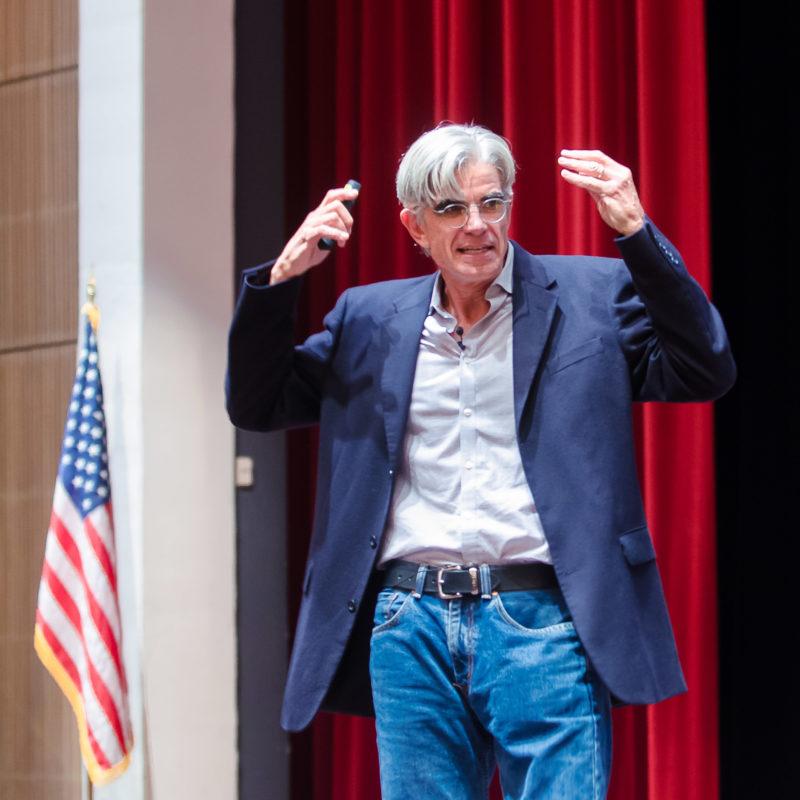During a time of increasing awareness regarding health, the opportunity to discuss harmful eating habits was welcomed by Trinity. On Wednesday, Aug. 24, reporter Michael Moss delivered the Reading TUgether lecture on his critically acclaimed book “Salt, Sugar, Fat: How The Food Giants Hooked Us.” Moss has previously earned a Pulitzer Prize for Explanatory Reporting because of his work studying the food industry.
“Salt, Sugar, Fat” was chosen for the new first year students to read over the summer. Moss explores controversial subject matter in his novel and his claims and opinions will be discussed both inside and outside the classroom.
Moss was inspired to write this book through his investigation on the contamination of food. His research focused on some of the most commonly known and discussed foodborne illnesses.
“I was writing about E-coli and salmonella and other pathogens that get into food and contaminate it. It was absolutely fascinating,” Moss said.
“One of my best sources, a scientist who tests hamburgers for E-coli, at one point said to me, “˜Look Michael, as tragic as these incidents of contamination are, you really should look at things my industry ““ sort of the meat industry ““ intentionally add to its products, over which it has absolute control.’ And he’s talking about salt, and when I started looking at salt, I then started asking, what are the other big things that they add to their products, and then I found sugar and then I found fat, and so that was the start: it was this pathogen expert steering me in the other direction.”
Moss gave his readers the incentive to adopt healthier lifestyle choices. His investigations of huge companies such as Kraft and General Mills expose dangers in common foods students may unknowingly digest. “Salt, Sugar, Fat” also aligns with Trinity’s incentive to bring students, faculty, staff and the surrounding community a wider range of healthy options; other efforts include Trinity organizations such as the Trinity Market and TU Fit: the Health club.
“I’m thinking about the audience being students and just San Antonio and Trinity. I feel like it really aligned well with our wellness initiatives,” said Sheryl Tynes, professor of Sociology and Vice President for Student Life.
“I think all of us can stand to be more mindful of what we put in our bodies, and so to me that message really was perfect in terms of the timing for our campus.”
Tynes believed that significant change is occurring on the Trinity campus and beyond, as the way the community views healthy eating and processed foods is actively being challenged by reporters and students alike.
“I think that our entire culture is more aware of food-related issues,” Tynes said. “I think that we’re at the very beginning of conversations about the role of food and our health. I think about our campus and these kinds of issues in terms of just overall health but I think there’s a message in here for all of us and so I think the committee really liked that. They liked the fact that this could potentially change behavior.”
Throughout the book, Moss points to the addictive properties of processed foods and how large companies engage in an elaborate process in order to create products that will have their customers hooked. Trinity faculty, staff and students have picked up on this cue, and have begun discussing the consequences of this behavior on the buyers who choose to consume these food products in a variety of settings, such as seminar courses or casual conversation.
“Considering food as like a drug, and almost thinking of it as having addictive properties, is kind of like almost a game changer,” said Zachary Carter, a first-year physics major.
Despite dealing with a difficult subject matter and exposing a number of secrets behind the processed food industry, Moss still manages to remain in good standing with several of the most well-known food giants. This is thanks largely in part to his noticeably civil personality and behavior.
“He always seemed to be pretty nice and courteous to the people he’s interviewing, and it’s almost like he understood the situation they were in,” Carter said. “A lot of times he didn’t look at them as offenders, but almost as victims of the system, like they had to do this to stay competitive. It’s like he understands what they’re going through.”
At the end of his lecture, Moss strongly encouraged the audience of students, faculty and other citizens of San Antonio to have a real conversation about food with their loved ones and to get more people engaged in the discussion. He stated that he understood that millions of Americans consume processed food, often not by choice and that most of them will continue to do so for a variety of reasons. His primary goal, however, is to help as many people as possible become more aware of unhealthy habits and learn how to lead healthier lifestyles in an effort to improve their overall wellbeing.







